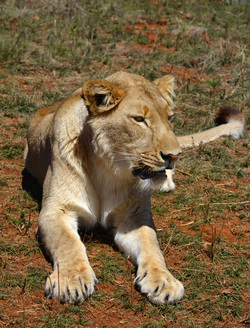
Green hunting is the stalking and darting of large animals such as rhino to enable the “hunter” to have his photograph taken with the victim before the tranquillizer wears off and the animal recovers. This has fallen out of favour in S.A. because of the abuse of the idea: tranquillising is a life –threatening and traumatic assault , and some valuable animals have been killed thereby and / or darted excessively.
Where money comes in, morals fly out and green hunting is no exception.
Regulations and control by an independent body is another idea that, like green hunting, sounds good until it is proved to be unworkable. Once again, money is the problem. When money comes in, rules and regulations fly out.
There is no legal power for government to require an independent body of regulators to supervise every hunt, so it would have to be a voluntary control. The industry would never agree voluntarily to subject itself to such an intrusive form of supervision. And besides, if a rich hunter has an obsession to swing a lion from a chandelier and shoot arrows in to the victim, then hunting operators and regulators can be persuaded to look the other way.
Adding a regulator supervisor to the system merely adds another person to the payroll especially in a third world country like South Africa where officials are so vulnerable to corruption.
Of course, the canned hunting of captive bred animals is not a sport, where the rules of the game can be altered to remove distasteful aspects. In fact it is a form of farming. Farming with wildlife bred as alternative livestock. And really the shooting of bullets and arrows into defenceless captive bred animals is as unthinkable as shooting them into sheep or cattle.
Any attempt to regulate such despicable misconduct implies that the behaviour is acceptable so long as there is some (undefined) regulation.
So, by way of comparison, should we legalise cocaine because it is perhaps “less harmful than heroine?
Should we legalise human trafficking so long as there are toilets in the shipping containers?
Or do we just use common sense and decency to ban canned hunting on the ground that is is inherently cruel and harmful and that hunting animals for fun is morally unacceptable. For an idea of what life is like for the captive bred lions, see Kirsten’s blog:
http://lionexploitation.wordpress.com/real-life-experiences/kirstens-blog/
If the animal protection laws do not allow farmed sheep and cattle to be shot at, wounded, and terrorised, why is it acceptable to inflict such suffering on farmed wild animals? For an idea of how prolonged and severe the agony of the target animal is, read our blow by blow account of the canned rhino hunt at Kuruman, in our book Kalahari Dream. It is available on Amazon or Smashwords.
